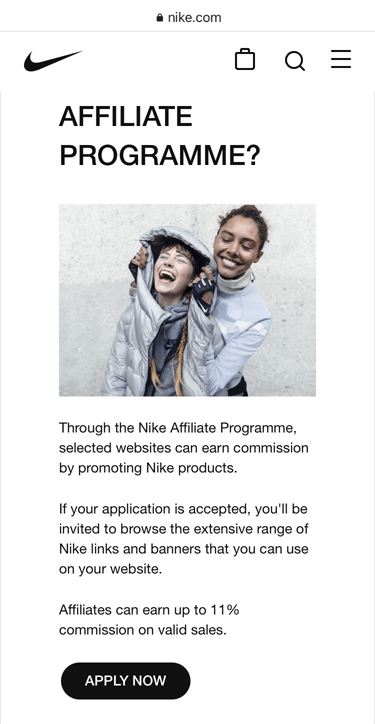
One of the biggest questions I get asked is “is affiliate marketing legit?“.
I get that question so often, that I’ve decided to write a blog post about it.
This question is usually asked by 2 groups of people:
- Those who have been scammed or fallen victim to a scam in the past
- Those who do not want to be involved in a scam or shady business dealings.
Whilst there are a ton of opportunities around online and offline, there are lots of scams aswell.
Affiliate marketing as a business model isn’t a scam.
It’s a real business.
I’ve been an affiliate marketer since 2012 and if affiliate marketing wasn’t a legit business, I certainly wouldn’t be involved in it.
But since you don’t know me, you’re obviously not going to take my word for it.
So Is Affiliate Marketing Legit?
So instead I’ll show some examples of affiliate marketing…
Some of the biggest companies in the world have affiliate programs:
Look at this one from Amazon (although I don’t recommend Amazon for all the reason’s I mention here):

And another from Hewlett Packard:

Nike have one:

Even Apple iTunes have one:

So as you can see, some of the biggest brands in the world have affiliate programs.
If affiliate marketing wasn’t a legit business model, I doubt that any of those companies would be involved in it, do you?
Affiliate marketing is a huge industry, you’re not just limited to physical products either, you can promote digital products for a good commission aswell, this is what I do.
I use Clickbank mainly to promote digital information products.
But here’s the thing, even though Affiliate Marketing is a legit business model, not all affiliate programs are honest.
I teach you all about this in my free affiliate marketing codebook that you can get here, just let me know your email address on that page and I’ll send it to your inbox free of charge.
You should make sure whatever affiliate program you choose, you can answer “YES” to the following:
- do they have a good reputation?
- Are their products good and useful?
- Do they pay out a good commission?
- Do they pay on time?
Before applying to any affiliate program, you need to be able to answer yes to all of the above.
They are all vitally important questions that only a “yes” answer is will do.
If the answer is “no” to any of them, find a different affiliate program to join.
So with that being said…
What are the signs of a bad affiliate program?
There are many signs an affiliate marketing program may not be legit, I’m going to run through a few of them here.
Let’s jump in…
- Anything that requires you to pay to promote it.
Generally speaking, any affiliate program that requires you to pay is probably crossing into the territory of a scam.
But not always.
Some affiliate programs require you to buy the product first, this is because they want you to understand what the product is, so that you can promote it more effectively.
I’d actually encourage you to purchase any affiliate product you are thinking of promoting first anyway, for a few reasons:
The first one being, you want to make sure the product you’re planning on promoting is good and meets the needs of your customers.
Second, it’s a good idea to go through the sales flow and experience it in the same way one of your customers will.
You want to make sure it is what it says it is.
But any affiliate program that FORCES you to buy it and not by choice, should generally be avoided.
This brings me to the second sign of a bad affiliate program…
- Avoid anything that requires you to pay an ongoing subscription to promote the product, or anything that requires you to sell a certain amount on a monthly basis.
This generally falls into the bracket of an MLM scheme.
Some MLM scheme’s are completely legitimate, I just don’t like them.
I shy away from anything that even remotely looks like an MLM.
And anything that requires you to pay an ongoing subscription or sell a certain amount on a monthly basis, generally means there’s more than a good chance it’s an MLM scheme and you should avoid it.
MLM Programs and pyramid scheme’s rarely make money unless you’re very high up the ‘food chain’.
Hence the word ‘Pyramid’.
That’s just my personal opinion.
Moving on to #3 which is…
- There isn’t any obvious way to contact the product owner, or there is no name.
Can you contact the product owner?
Is there a way to contact the company or product owner?
Let me be clear, not having personal contact details that are easy to find on display isn’t a major issue by itself, as a lot of sellers will provide that after purchase.
This is why it’s always a good idea to purchase the product first.
However, what I will say is, NO contact information whatsoever is generally a red flag and should be a consideration.
It’s just not the be all and end all, providing those details are made available after purchase.
It comes back to what I said before, check the product out and actually buy it, you want to have the same experience as your customers.
The last thing you want to promote is some phantom product created by some faceless figure.
NO contact details, even after purchase, is a huge no-no as far as I’m concerned.
- Issues with late or no payments to affiliates.
The worst thing in the world, is promoting a product as an affiliate and then being paid late, or in some cases, not being paid at all.
Do your research.
As a rule of thumb, if you see lots of other Affiliates promoting the product you’re planning on promoting, you’ll probably be ok.
It doesn’t hurt to do a quick search of the product on Google and see what comes back.
- Avoid promoting anything with wild or outlandish claims.

Eg: “make $10,000 dollars a day at the push of a button”
“Lose 14 pounds of belly fat in 7 days”.
Those are quite extreme examples, but you get the idea.
Legit affiliate marketing programs and their products, don’t make these sorts of claims.
And you shouldn’t want to align yourself with any product that does make those type of claims.
Another reason is, over hyped up products in almost all cases have sky high refund rates.
All this is going to do, is destroy any trust between you and your customer and ruin your reputation.
6. More bad reviews than good ones.
Every product isn’t going to please every customer.
The best product on earth isn’t going to satisfy every customer.
Every product gets the odd bad review here and there.
But if there are more bad reviews than good reviews, avoid It.
Choose something else.
It’s not worth the damage it will do to your reputation.
You can read product reviews on Google, just simply type the name of the product +review.
Another good place is Trust Pilot.
Asking yourself the question “is affiliate marketing legit?” Is a perfectly normal question to ask.
The fact you have asked that question shows you are an honest person with sound intentions.
The industry needs good people like you.
If you’d like to know more about affiliate marketing, I’d like to send you my “Affiliate Marketing code book” directly to your email inbox free of charge, just go here: https://grabyourlifestyle.com (includes a real life case study!).